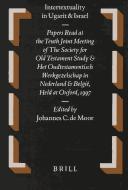| Listing 1 - 2 of 2 |
Sort by
|

ISSN: 01697226 ISBN: 9004102663 900449751X 9789004102668 9789004497511 Year: 1996 Volume: 33 Publisher: Leiden New York : E. J. Brill,
Abstract | Keywords | Export | Availability | Bookmark
 Loading...
Loading...Choose an application
- Reference Manager
- EndNote
- RefWorks (Direct export to RefWorks)
The Reform of King Josiah and the Composition of the Deuteronomistic History defends the thesis that 1 and 2 Kings arose in three redactional phases. The first author described the history of Judah and Israel from Solomon to Hezekiah (1 Kgs 3-2 Kgs 20). A second redactor, inspired by Deuteronomy, completed the history up to King Josiah and altered the work of his predecessor. The work of these two redactors was limited to Kings. A third redactor, also inspired by Deuteronomy, completed the history up to the exile. Unlike the preceding authors he reworked the whole of the deuteronomistic history. The first part of this study subjects the regnal formulae to a critical analysis. The second part studies 2 Kgs 23:1-30 as a text case in detecting the redactional structure of Kings.
D [Document ] (Exégèse biblique) --- D document (Biblical criticism) --- D traditie (Bijbelexegese) --- Document D (Exégèse biblique) --- D document (Biblical criticism). --- Josiah, --- Bible. --- Criticism, interpretation, etc. --- 222.4 --- Deuteronomist document --- Deuteronomistic history (Biblical criticism) --- Deuteronomium --- Josiah King of Judah --- Theses --- Josia, --- Josias, --- Yoshiyahu, --- Gioas, --- יאשיהו, --- Bible. O.T. Kings, 2nd, XXII-XXIII --- Criticism, interpretation, etc --- Deuteronomist history (Biblical criticism) --- Bible. A.T.. Rois --- Bible. A.T.. Rois. II --- Josias (06..-0609 av. J.-C. ; roi de Juda) --- Bible. A.T. Deutéronome --- Document (Critique biblique) --- Critique rédactionnelle --- 23, 1-30 --- Critique, interprétation, etc.

ISSN: 01697226 ISBN: 9004106669 9004497951 9789004106666 9789004497955 Year: 1996 Volume: 38 Publisher: Leiden New York : E. J. Brill,
Abstract | Keywords | Export | Availability | Bookmark
 Loading...
Loading...Choose an application
- Reference Manager
- EndNote
- RefWorks (Direct export to RefWorks)
This study deals with the intricate problem of the deuteronomistic composition of the book of Kings. Its particular aim is to reconstruct the compositional process underlying the final chapters of Kings. The literary-critical assessment of these chapters is a central issue in various theoretical models on the composition of the Deuteronomistic History. The author draws attention to the - often crucial - importance assigned to the Manasseh pericope and related passages in this assessment. He notes that in many models the appraisal of these texts appears to result from general theoretical concerns rather than from an independent literary-critical analysis. This study fills the need for such an analysis. The results lead the author to advance a fresh view on the composition of the last section of the Deuteronomistic History.
Deuteronomistic history (Biblical criticism) --- Deuteronomistische geschiedenis (Bijbelkritiek) --- Histoire deuteronomiste (Critique biblique) --- Deuteronomistic history (Biblical criticism). --- Manasseh, --- Bible. --- Criticism, interpretation, etc. --- Monographic series --- 222.4 --- Deuteronomic history (Biblical criticism) --- Deuteronomists (Biblical criticism) --- DH (Biblical criticism) --- D document (Biblical criticism) --- Deuteronomium --- Theses --- Manasseh --- Bible. O.T. Kings, 2nd, XXI, 1-18 --- Criticism, interpretation, etc --- Manasseh, - King of Judah. --- Bible. - O.T. - Kings, 2nd, XXI, 1-18 - Criticism, interpretation, etc. --- Manassé (roi de Juda ; 0707-0642 av. J.-C.) --- Bible. A.T.. Rois. II --- 21, 1-18 --- Critique, interprétation, etc.
| Listing 1 - 2 of 2 |
Sort by
|

 Search
Search Feedback
Feedback About
About Help
Help News
News